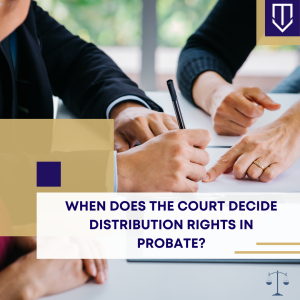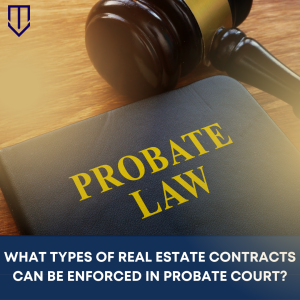 When a person passes away and leaves behind the property, their property must first pass through the probate process before being passed down to family members and loved ones. Essentially, the probate process is a legal process that determines the execution of the estate of someone who has passed away. Moreover, during the probate process, the court appoints an executor or an administrator to administer the deceased’s estate. Therefore, probate property refers to any assets or property left behind by a deceased person that passes through the probate process.
When a person passes away and leaves behind the property, their property must first pass through the probate process before being passed down to family members and loved ones. Essentially, the probate process is a legal process that determines the execution of the estate of someone who has passed away. Moreover, during the probate process, the court appoints an executor or an administrator to administer the deceased’s estate. Therefore, probate property refers to any assets or property left behind by a deceased person that passes through the probate process.
It is possible to sell or buy probate property while it is still in the probate process. However, the sale of probate property is different from a standard sale of real property, and there are court and statutory procedures that need to be taken into consideration. At the Underwood Law Firm, our attorneys are more than familiar with the sale of probate property and the requirements that follow.
 California Partition Law Blog
California Partition Law Blog


 For family members of a deceased loved one, the most important part of probate proceedings is the final distribution of the estate. This occurs once the estate’s debts and obligations have been satisfied, and it serves to more or less end the probate of the estate.
For family members of a deceased loved one, the most important part of probate proceedings is the final distribution of the estate. This occurs once the estate’s debts and obligations have been satisfied, and it serves to more or less end the probate of the estate. 
 A deed is a legal instrument, evidenced in writing, to confirm the ownership interest or legal rights of an owner of real property. Essentially, a deed is necessary to determine the titleholder of a piece of real estate. Moreover, a deed grants an owner of real property legal rights to convey, sell, or transfer the property. Therefore, when purchasing a piece of real property, it is extremely important for a person to obtain a deed in order to evidence their ownership in writing and protect their legal rights in the property.
A deed is a legal instrument, evidenced in writing, to confirm the ownership interest or legal rights of an owner of real property. Essentially, a deed is necessary to determine the titleholder of a piece of real estate. Moreover, a deed grants an owner of real property legal rights to convey, sell, or transfer the property. Therefore, when purchasing a piece of real property, it is extremely important for a person to obtain a deed in order to evidence their ownership in writing and protect their legal rights in the property.  A property’s legal description is an essential element of any property transfer, and it serves as the basis for most property-based lawsuits.
A property’s legal description is an essential element of any property transfer, and it serves as the basis for most property-based lawsuits.  An estate is categorized by the duration of time one holds an interest in the estate. For example, an estate acquired through inheritance is categorized differently from an estate for years. There are three different ways an estate can be categorized, which is codified in California Civil Code section 765. Essentially, section 765 categorizes an estate based on the character of the property.
An estate is categorized by the duration of time one holds an interest in the estate. For example, an estate acquired through inheritance is categorized differently from an estate for years. There are three different ways an estate can be categorized, which is codified in California Civil Code section 765. Essentially, section 765 categorizes an estate based on the character of the property. 
 Yes, although the tenant is not allowed to exclude the non-consenting owners. The reason for this is grounded in ancient legal doctrine regarding the “right to possession” that all co-owners of property share together. Each owner may exercise this right, and each may grant it to a third party, should they so choose, even without the consent of the other owners.
Yes, although the tenant is not allowed to exclude the non-consenting owners. The reason for this is grounded in ancient legal doctrine regarding the “right to possession” that all co-owners of property share together. Each owner may exercise this right, and each may grant it to a third party, should they so choose, even without the consent of the other owners.  While it may not be obvious, a sizeable portion of the work that real estate agents and realtors do is court-ordered. Real estate law is a massive field, and often, the disposition of litigation results in the court forcing the sale of a property, be it a business, home, condominium, etc. As such, many realtors find themselves acting as agents or referees for parties to a lawsuit.
While it may not be obvious, a sizeable portion of the work that real estate agents and realtors do is court-ordered. Real estate law is a massive field, and often, the disposition of litigation results in the court forcing the sale of a property, be it a business, home, condominium, etc. As such, many realtors find themselves acting as agents or referees for parties to a lawsuit.  Real estate contracts are an expansive field of both law and life.
Real estate contracts are an expansive field of both law and life.